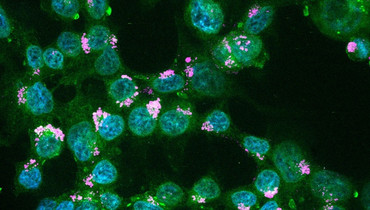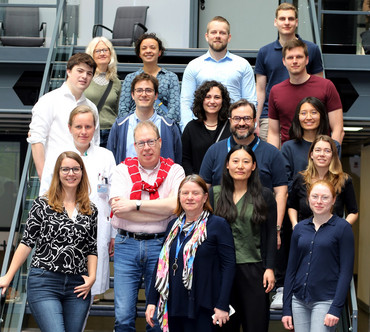Research Project CANACO launched: better imaging-based and targeted therapy of colon cancer with only minor side effects


(umg) About 60,000 women and men are diagnosed with colon cancer in Germany every year. It is thus the third most common cancer in the country. Treating colon cancer patients is a challenge: the tumors have a wide array of molecular biological differences and cause a multitude of different symptoms. More than 50 percent of patients develop metastases. This leads to an unfavorable prognosis for recovery. In many cases, the efficacy of drug based therapies for metastasized colon cancer is limited. The drugs may also have severe side effects.
The collaborative project “Cancer-specific Multidrug Nanocarrier for the Therapy and Imaging of the Colorectal Carcinoma” (CANACO) was initiated within the framework of the German Cancer Aid research pillar “Translational Oncology” to develop an effective therapy for patients suffering from colon cancer or colorectal carcinoma (CRC). Professor Dr. Frauke Alves is the coordinator of the research project, which has been granted around one million Euro by the German Cancer Aid. Professor Alves is also the leader of the working group “Translational Molecular Imaging”, which is associated with the Department for Hematology and Medical Oncology and the Institute for Diagnostic and Interventional Radiology at the University Medical Center Göttingen (UMG) as well as the Max Planck Institute for Multidisciplinary Sciences (MPI-NAT). The project is supported by a multidisciplinary consortium of biologists, chemists, and physicians from: i) the Oncological Center of Excellence at the UMG: Dr. Dr. Lena-Christin Conradi, Clinic for General, Visceral and Paediatric Surgery, head of the working group “Tumor cell metabolism and epigenetic regulation in the development of new therapy approaches for colorectal and pancreas carcinoma”, and Dr. Joanna Napp, Translational Molecular Imaging; ii) from the Hospital rechts der Isar of the Technical University Munich (TUM) as a further Oncological Center of Excellence: Professor Dr. Susanne Kossatz, head of the working group “Imaging & Biomarkers in Oncology”, and Dr. Alexander Wurzer, Research Assistant, both at the Clinic and Polyclinic for Nuclear Medicine and iii) from the Karlsruhe Institute of Technology (KIT): Professor Dr. Claus Feldmann, Director of the Institute for Inorganic Chemistry.
To achieve a higher efficacy in the treatment for colon cancer while reducing side effects, the researchers are relying on new, highly modifiable nanoparticles with a size of less than 100 nanometers. This makes the particles a thousand times smaller than the width of a single hair. The particles were custom made by Professor Feldmann to transport drugs into the tumor. Because of their function, these particles are also called “nanocarriers”. These “Multidrug Targeted Carriers” (MTNC) can deliver considerably higher drug concentrations than common nanocarriers, and carry at least two different chemotherapeutic drugs at the same time. In addition, tumor specific antibodies or peptides on the surface of the MTNC enhance the ability to bind to the tumor cell. This both enhances the accumulation of chemotherapeutic drugs in the tumor and reduces side effects.
The therapeutic efficacy of the MTNCs will be tested in clinically relevant mouse models of colorectal cancer in which tumors are grown from patient material. To track the biodistribution of the nanoparticles as well as the release of the drugs in deep tissue with optical imaging within the living organism, the MTNC will be equipped with fluorescent dyes. These dyes will be excited with light, begin to glow, and can then be detected with a special camera system. In this way, the therapeutic concept can be tested and optimized in a pre-clinical setting. The accumulation of MTNC in the tumor will also be verified with another imaging system, the so-called Positron Emission Tomography (PET), a method that can also be applied to humans. For this approach, the MTNC are labeled with radionuclides and their biodistribution is tracked via the radiation they emit. In the future, this will serve to select the patients that qualify for MTNC therapy.
“We expect a higher accumulation of clinically approved chemotherapeutics which can be transported in our Multidrug Targets Nano Carriers to allow for an improved therapeutic efficacy with simultaneously reduced side effects. This method has great potential to be used in personalized therapies for colon cancer patients and to improve overall survival rates in the future”, says Professor Alves.
The studies in cell culture and animal models in CANACO are strictly geared towards delivering all necessary information for conducting a clinical trial.
CONTACT
University Medical Center Göttingen, University of Göttingen
Department of Haematology and Medical Oncology
Department of Diagnostic and Interventional Radiology
Professor Dr. Frauke Alves, Phone +49 551 / 39-66991
frauke.alves(at)med.uni-goettingen.de
University Medical Center Göttingen, University of Göttingen
Göttingen Comprehensive Cancer Center (G-CCC)
Public Relations and Science Communication
Mandy Dall, Phone +49 551 / 39-62152
ccc(at)med.uni-goettingen.de, gccc.umg.eu